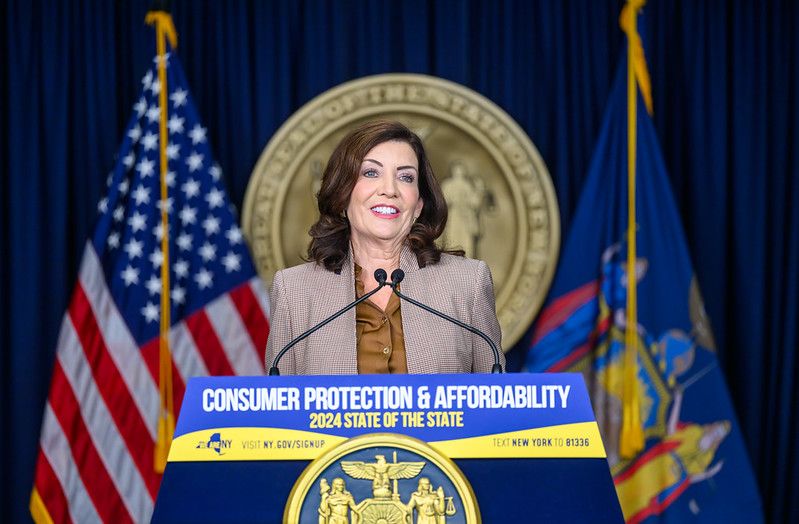New York governor aims to limit hospital lawsuits against patients
Gov. Kathy Hochul is pushing legislation to prevent health systems from suing patients below certain income limits to collect medical debts.
New York Gov. Kathy Hochul is pushing for legislation that would make it harder for hospitals to sue patients to collect debts.
New York Gov. Kathy Hochul is proposing legislation to prohibit hospitals from suing patients over medical debt if they are under certain income limits. (Image: New York governor's office)

Hochul introduced her plans earlier this week. Under Hochul’s plan, hospitals in New York would be prohibited from suing patients if their income is less than 400% of the federal government’s poverty level. For a family of four, the income limit would be $120,000.
More than 700,000 New York residents have medical debt in collections, according to Hochul’s office. Hochul’s effort is part of a broader package to expand the state’s consumer protection laws.
Hochul also proposes to expand hospital financial assistance programs for New York residents with lower incomes. She’s expected to reveal more details on her plans in next week’s State of the State address.
- Read more: New York moves toward cybersecurity regulations for hospitals, paving way for other states
New York State Department of Health Commissioner James McDonald said the measure would offer needed protection to residents.
“Governor Hochul’s actions will protect low-income New Yorkers from medical debt lawsuits and take necessary steps to expand financial assistance programs at hospitals,” McDonald said in a statement. “This legislation addresses the toll medical debt has taken on individuals’ financial wellbeing and is a significant step toward protecting all New Yorkers from medical debt.”
The governor’s office also released a statement of support from AARP New York State Director Beth Finkel, who said, “We’re encouraged by the Governor’s plan to expand consumer protections and protections from medical debt for low-income New Yorkers.”
It’s the latest effort Hochul has undertaken aimed at offering New York residents more protections from medical debt. Last month, Hochul signed legislation that bars hospitals and healthcare providers from reporting medical debt to credit agencies. Under the legislation, credit agencies are prohibited from factoring medical debt in credit reports, CBS News reports.
According to the Community Service Society of New York, which has pushed to end medical debt, New York hospitals have sued 75,000 patients to collect medical debts since 2015.
Last year, Colorado became the first state in the nation to pass legislation preventing medical debt from showing up in credit reports.
President Biden’s administration has also been paying attention to medical debt. In April 2022, the White House said it was requesting information from hospitals about how they collect debts. The Small Business Administration said in February 2023 that it was discouraging lenders from considering medical debts.
Roughly one in five U.S. households carries some form of medical debt, according to a 2022 report from the Consumer Finance Protection Bureau.
In September 2023, the bureau said it was considering measures on a national level to prevent consumer reporting companies from considering medical debt and collection information in consumer reports.
Hochul is also proposing legislation to eliminate insulin co-pays. She’s also introducing a plan to improve benefits for paid medical and disability leave.
Children’s hospitals face complex challenges dealing with disasters
April 18th 2025Pediatric hospitals deal with different factors in weather-related events and other emergencies. Terri Wilson of the Children’s Hospital Association talks about the challenges and the need for more planning and support.